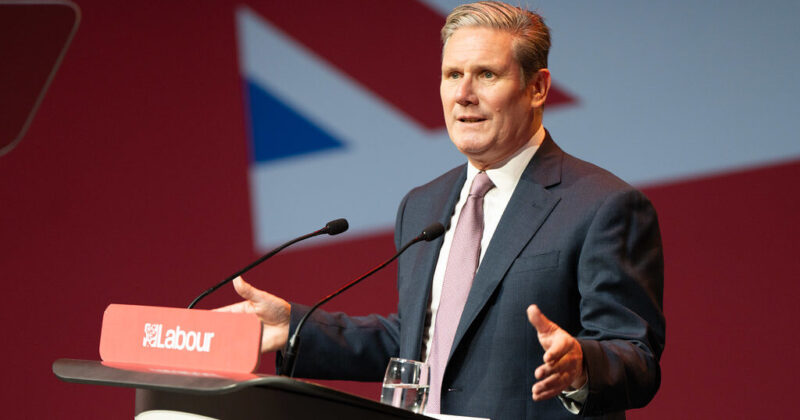

By George Banks
When Israel attacked Gaza following Hamas’ 7 October attack, Keir Starmer was quick to declare Labour’s ‘unconditional’ support for Israel’s ‘right to defend itself’. That he should take such a position is no surprise, given his record as the scourge of the Labour left, and the way that he weaponised the slur of antisemitism against Corbyn and co. However, defence of Israel has been a constant of Labour policy for decades, a consequence of its unconditional support for UK and US strategy across the Middle East.
In a radio interview, Starmer claimed Israel ‘had the right’ to deny essential supplies, such as food, water and fuel, to the civilian population of Gaza. While aides tried to clarify that he meant Israel should follow ‘international law’, his refusal to heed calls from within the party and shadow cabinet to back a ceasefire ‘now’ gave the lie to his claim that Labour was not giving Israel ‘a blank cheque’.
Mounting pressure may prompt further qualifications to Labour’s slavish defence of Israel but if so they will be a result of cynical electoral calculation rather than any principle. Opposition to Starmer is not restricted to the remains of the Labour left but is spreading to broader layers of the membership including elected office holders.
Mounting unease at the electoral implications of Labour’s uncritical support for Israeli war crimes have prompted senior Labour leaders to break ranks. Anas Sarwar, Andy Burnham and Sadiq Khan, and 12 Westminster frontbenchers have, a full three weeks after the bombing started, publicly called for a ceasefire.
Dozens of councillors have resigned, including nine in Oxford, losing Labour its majority on the council. 330 councillors have signed a letter calling for a ceasefire, in addition to a letter signed by 250 Muslim councillors. Amongst the Muslim population in particular, the issue is a burning one. They represent approximately 6.5% of the UK population but are, by and large, concentrated in urban centres. These are Labour’s supposedly safe seats. Labour hold all 20 constituencies with the highest proportion of Muslim voters. This calculation explains why calls for a ceasefire straddle the party from centrist Mayors to arch-Zionists like Jess Phillips.
Labour leaders have tried to frame the dissent as a ‘Muslim issue’. But this exposes not only their contempt for voters, but also their misreading of the situation. As the growing protest movement demonstrates, the struggle of the Palestinians against Israeli oppression is supported by broad swathes of the UK population. Hundreds of thousands have taken to the streets to condemn Israel’s invasion of Gaza and the UK government’s response.
Defiance
While resignations from the party are understandable, they are not the most effective strategy against Starmer and the right wing. The leadership’s attempt to control dissent by simply declaring it banned has disintegrated on contact with reality. Open defiance should take the form of calls on Starmer to call on Israel to stop the bombing, withdraw the troops, and end the siege of Gaza and occupation of the West Bank.
The campaign for this change of policy must also be taken into the trade unions, linking it to Labour’s equally spineless failure to support workers in their fight against Tory economic and social policy. Such a mass campaign could both threaten the already shaky grip Sunak has on government and prepare the ground for defending workers’ interests in the approaching general election campaign and, no doubt, against an incoming Labour government under its present leadership.